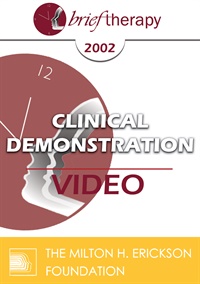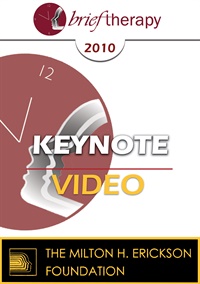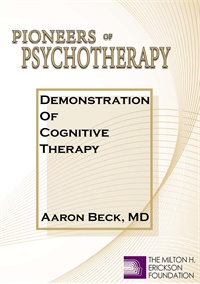
Credit available - Click Here for more information
- Average Rating:
- Not yet rated
- Topic Areas:
- Clinical Demonstrations | Abuse | Addiction | Psychotherapy | Role Play | Cognitive Behavior Therapy (CBT) | Relationships
- Bundle(s):
- Pioneers of Psychotherapy Bundle
- Categories:
- Pioneers of Psychotherapy | Online Continuing Education | Evolution of Psychotherapy | Evolution of Psychotherapy 1995
- Faculty:
- Aaron Beck, MD
- Course Levels:
- Master Degree or Higher in Health-Related Field
- Duration:
- 00:59:00
- Format:
- Audio and Video
- Original Program Date:
- Dec 15, 1995
- Short Description:
- Aaron Beck (1995) selects a clinician to role-play a male client. The client, Mike, was abandoned by his wife after she had multiple affairs. Mike is a recovering alcoholic with a sexually transmitted disease who suffers from dating anxiety, childhood trauma, and feelings of inferiority. Beck demonstrates how to establish a collaborative relationship with the patient.
- Price:
- $59.00 - Base Price
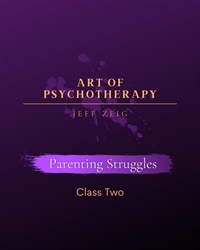
- Average Rating:
- Not yet rated
- Topic Areas:
- Utilization | Clinical Demonstrations | Psychotherapy | Therapist Development | Children and Adolescent Therapy | Interviewing | Relationships | Therapeutic Relationship
- Bundle(s):
- Art of Psychotherapy - Utilization Series
- Categories:
- Art of Psychotherapy
- Faculty:
- Jeffrey Zeig, PhD
- Course Levels:
- Master Degree or Higher in Health-Related Field
- Duration:
- 2 Hours 18 Minutes
- Format:
- Audio and Video
- Original Program Date:
- Jun 28, 2020
- Short Description:
- Demonstration subject Mette is struggling with issues trying to feel an emotional connection to her children. She describes her difficulty with being present for her children, and is looking for guidance. Dr. Zeig exhibits a few simple techniques that help create a powerful therapeutic relationship quickly, through the use of gestures and strategic interview questions. Dr. Zeig is able to utilize this information to create useful suggestions to help Mette with her situation.
- Price:
- $79.00 - Base Price
- Average Rating:
- Not yet rated
- Topic Areas:
- Clinical Demonstrations | Relationships | Brief Therapy | Pain and Healing
- Categories:
- Brief Therapy Conference | Brief Therapy Conference 2002
- Faculty:
- Robert Dilts, BA
- Course Levels:
- Master Degree or Higher in Health-Related Field
- Duration:
- 1:00:00
- Format:
- Audio and Video
- Original Program Date:
- Dec 13, 2002
- Short Description:
- Educational Objectives: 1) To define the three perceptual positions used with challenging relationships. 2) To describe how to guide clients to forge new understandings with significant others.
- Price:
-
Sale is $29.00
price reduced from Base Price - $59.00
Tags: Pain & Healing Relationships
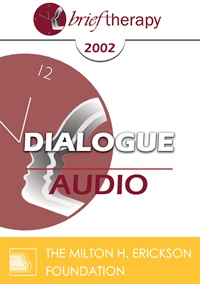
- Average Rating:
- Not yet rated
- Topic Areas:
- Dialogues | Love | Relationships | Brief Therapy | Communication
- Categories:
- Brief Therapy Conference | Brief Therapy Conference 2002
- Faculty:
- Insoo Kim Berg, MSSW
- Duration:
- 1:00:54
- Format:
- Audio Only
- Original Program Date:
- Dec 13, 2002
- Short Description:
- What actually creates change in love relationships? In this lively dialogue, Berg and Love compare solution-focused and neurobiological perspectives on couples work. Through case examples and audience consultation, they explore how hope, small behavioral shifts, expectation, and brain science intersect in real clinical practice. The conversation offers practical ways to interrupt stuck patterns and help partners become healing agents for one another.
- Price:
- $15.00 - Base Price

- Average Rating:
- Not yet rated
- Topic Areas:
- Short Courses | Adlerian Therapy | Brief Therapy | Therapist Development | Relationships
- Categories:
- Brief Therapy Conference | Brief Therapy Conference 2002
- Faculty:
- James Bitter, EdD | William Nicoll, PhD
- Duration:
- 1:19:43
- Format:
- Audio Only
- Original Program Date:
- Dec 12, 2002
- Short Description:
- Five areas that define Adlerian Brief Therapy (ABT) are addressed within a relationshipintervention focusing continuum. Depending on emphases along the continuum, the process of therapy can look quite different even within the Adlerian model. Two approaches to ABT are delineated and demonstrated in this session: one emphasizing relational qualities and integration of Adlerian teleology with awareness, contact and experience; the other organizing the session around strategies for change.
- Price:
- $15.00 - Base Price
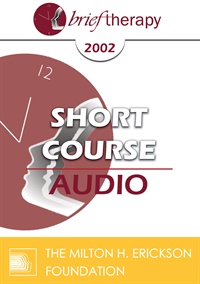
- Average Rating:
- Not yet rated
- Topic Areas:
- Short Courses | Brief Therapy | Family Therapy | Relationships | Strategic Therapy
- Categories:
- Brief Therapy Conference | Brief Therapy Conference 2002
- Faculty:
- Les Blondino, LPC, LMFT
- Duration:
- 1:17:05
- Format:
- Audio Only
- Original Program Date:
- Dec 12, 2002
- Short Description:
- Erickson recognized the vital importance of changing the client's relationships within their social contexts. Frequently, he included the client's family, friends and others to make therapy briefer with more permanent positive outcomes. Participants will learn ways to better understand the influence of social contexts, engage the social network and influence relationships to promote change. Case analogies will be given and videotape examples from actual session demonstrate the Strategic Family Therapy approach.
- Price:
- $15.00 - Base Price

- Average Rating:
- Not yet rated
- Topic Areas:
- Workshops | Anxiety | Depression | Happiness | Love | Relationships | Brief Therapy
- Categories:
- Brief Therapy Conference | Brief Therapy Conference 2002
- Faculty:
- Pat Love, EdD
- Duration:
- 1:40:50
- Format:
- Audio Only
- Original Program Date:
- Dec 15, 2002
- Short Description:
- To love and be loved. Sounds simple - yet for many it is one of life's most difficult challenges. Come and explore three major causes of unhappiness in relationships and gain a deeper understanding of how they are related.
- Price:
- $15.00 - Base Price
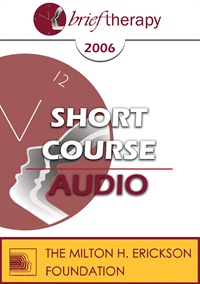
- Average Rating:
- Not yet rated
- Topic Areas:
- Short Courses | Anger | Brief Therapy | Couples Therapy | Relationships
- Categories:
- Brief Therapy Conference | Brief Therapy Conference 2006
- Faculty:
- Barton Goldsmith, PhD
- Duration:
- 1:10:40
- Format:
- Audio Only
- Original Program Date:
- Dec 07, 2006
- Short Description:
- This is a workshop that teaches the participants how to improve their work with couples, and how to use the client/practitioner relationship so that everyone grows. This experience is for therapists who wish to add proven techniques to their already successful ability to work with couples. Emotional fitness teaches the therapist how to see what it is their clients really want in a relationship and provides techniques for helping them achieve their goals.
- Price:
- $15.00 - Base Price
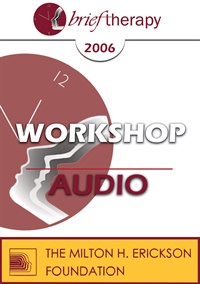
- Average Rating:
- Not yet rated
- Topic Areas:
- Workshops | Relationships | Therapist Techniques
- Categories:
- Brief Therapy Conference | Brief Therapy Conference 2006 | Pioneers in Couples and Family Therapy
- Faculty:
- Ellyn Bader, PhD
- Duration:
- 2:30:43
- Format:
- Audio Only
- Original Program Date:
- Dec 07, 2006
- Short Description:
- Discover Ellen Bader's groundbreaking developmental model for couples therapy. Learn the Four Pillars of Change, practical intervention strategies, and communication techniques to help couples break destructive patterns and build more resilient relationships. Through case studies and interactive demonstrations, therapists will gain tools to facilitate emotional healing and personal growth in brief therapy settings.
- Price:
- $15.00 - Base Price
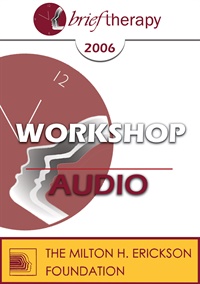
- Average Rating:
- Not yet rated
- Topic Areas:
- Workshops | Relationships | Therapist Development
- Categories:
- Brief Therapy Conference | Brief Therapy Conference 2006 | Pioneers in Couples and Family Therapy
- Faculty:
- Cloe Madanes, HDL, LIC
- Duration:
- 1:35:53
- Format:
- Audio Only
- Original Program Date:
- Dec 07, 2006
- Short Description:
- Practical tools for building stronger, more resilient relationships. Daily habits like public compliments, gratitude, and emotional regulation take center stage, along with strategies for managing resentments and strengthening trust. Emphasis is placed on meeting core human needs like certainty, love, growth, and more in order to create lasting connection. Participants are encouraged to move beyond labels, focus on understanding, and foster meaningful, lasting bonds.
- Price:
- $15.00 - Base Price
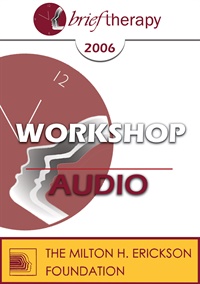
- Average Rating:
- Not yet rated
- Topic Areas:
- Workshops | Psychotherapy | Tailoring | Relationships | Brief Therapy | Therapeutic Relationship
- Categories:
- Brief Therapy Conference | Brief Therapy Conference 2006
- Faculty:
- John C. Norcross, PhD
- Duration:
- 2:38:59
- Format:
- Audio Only
- Original Program Date:
- Dec 09, 2006
- Short Description:
- BT06 Workshop 14 - Psychotherapy Relationships That Work: Tailoring the Relationship to the Individual Patient - John Norcross, PhDPsychotherapy will maximize its effectiveness by targeting the most powerful sources of change, the therapeutic relationship and the patient him/herself. This practical workshop will provide an integrative structure for customizing therapy relationships to individual clients. Participants will learn to reliably assess and rapidly apply four evidence-based guidelines (patient preferences, stages of change, resistance level, real-time feedback) for constructing the "relationship of choice."
- Price:
- $15.00 - Base Price
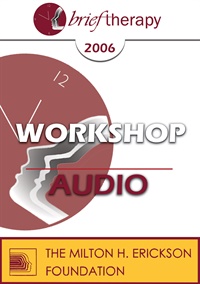
- Average Rating:
- Not yet rated
- Topic Areas:
- Workshops | Adlerian Therapy | Brief Therapy | Couples Therapy | Psychotherapy | Relationships
- Categories:
- Brief Therapy Conference | Brief Therapy Conference 2006
- Faculty:
- Jon Carlson
- Duration:
- 2:38:42
- Format:
- Audio Only
- Original Program Date:
- Dec 09, 2006
- Short Description:
- Brief Adlerian Couples Therapy will be described in detail. The key components of Adler's approach as they apply to couples therapy will be highlighted, including the numerous strategies and techniques that are unique to this approach. The program also will show how to integrate the strategies of other theories into this model. The core skills of effective relationships will be discussed and integrated into actual treatment protocols. Several examples from actual couples therapy sessions will be used to show the process as well as to demonstrate the strategies. The program will conclude with ideas that can be used to help couples prevent relapse after an effective intervention has been made.
- Price:
- $15.00 - Base Price

- Average Rating:
- Not yet rated
- Topic Areas:
- Workshops | Brief Therapy | Community | Relationships
- Categories:
- Brief Therapy Conference | Brief Therapy Conference 2006
- Faculty:
- Erving Polster, PhD
- Duration:
- 2:37:44
- Format:
- Audio Only
- Original Program Date:
- Dec 09, 2006
- Short Description:
- Within the enormous complexity of human experience, the reflex to connectedness rescues the person from fragmentation. Dr. Polster will portray connectedness along four dimensions: 1) person to person, enhancing relational experience and belonging; 2) moment to moment, restoring continuity and fluidity; 3) event to event, recovering life's storyline; 4) Characteristic to characteristic, integrating the self.
- Price:
- $15.00 - Base Price
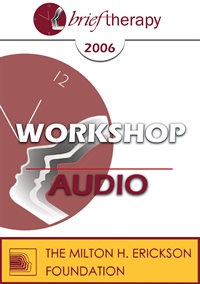
- Average Rating:
- Not yet rated
- Topic Areas:
- Workshops | Relationships
- Categories:
- Brief Therapy Conference | Brief Therapy Conference 2006 | Pioneers in Couples and Family Therapy
- Faculty:
- Michele Weiner-Davis, LCSW
- Duration:
- 2:19:05
- Format:
- Audio Only
- Original Program Date:
- Dec 09, 2006
- Short Description:
- Weiner-Davis offers a clear framework for conducting relationship therapy when only one partner is present. Drawing on her “Divorce Busting” model, she emphasizes the value of action-oriented, solution-focused work and the surprising power of individual change to shift relational dynamics. With case examples and practical tools, she illustrates how therapists can help clients foster reconnection, even in complex or high-stakes situations.
- Price:
- $15.00 - Base Price
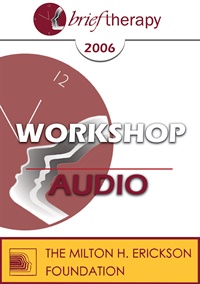
- Average Rating:
- Not yet rated
- Topic Areas:
- Workshops | Brief Therapy | Communication | Femininity | Masculinity | Couples Therapy | Relationships
- Categories:
- Brief Therapy Conference | Brief Therapy Conference 2006
- Faculty:
- Pat Love, EdD
- Duration:
- 2:29:51
- Format:
- Audio Only
- Original Program Date:
- Dec 10, 2006
- Short Description:
- A relationship can fail without conscious intent unless you understand the two major forces underlying resentment and alienation. Come learn how one shift in perception and three simple techniques can create harmony and happiness at home and work. This workshop will include lecture, video, practical handouts, experiential exercise and discussion.
- Price:
- $15.00 - Base Price
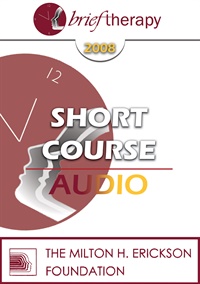
- Average Rating:
- Not yet rated
- Topic Areas:
- Short Courses | Brief Therapy | Relationships | Children and Adolescent Therapy | Family Therapy
- Categories:
- Brief Therapy Conference | Brief Therapy Conference 2008
- Faculty:
- Ramona Garnier, PhD
- Duration:
- 1:25:12
- Format:
- Audio Only
- Original Program Date:
- Dec 11, 2008
- Short Description:
- This presentation addresses the issues of teen anger and "acting out" from a brief therapy approach to treatment. Interventions psychotherapists can integrate into family therapy enhancing parent capabilities and encouraging improved relationships with their teens will be presented. An experiential exercise will be provided helping attendees integrate brief, goal-oriented approaches as well as hypnotic and strategic interventions.
- Price:
- $15.00 - Base Price
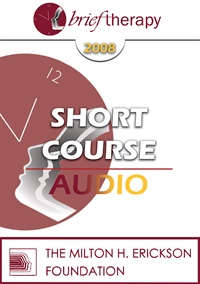
- Average Rating:
- Not yet rated
- Topic Areas:
- Short Courses | Aging and Mortality | Brief Therapy | Grief | Relationships
- Categories:
- Brief Therapy Conference | Brief Therapy Conference 2008
- Faculty:
- Kevin Humphrey, MA | Allan Sargent | Marilyn Sargent
- Duration:
- 1:19:57
- Format:
- Audio Only
- Original Program Date:
- Dec 11, 2008
- Short Description:
- Often, "oh, no!" is the first response to loss, be it a wallet, loved one, or dream. Something is gone. What happens next? One could get mired in cultural expectations that there must be denial, anger, depression - or, one can flow through the natural grief sequence to understanding, having appropriate emotions and being proactive. Learn how to get back into balance processing grief with nature's intention - having loving and healthy connections.
- Price:
- $15.00 - Base Price
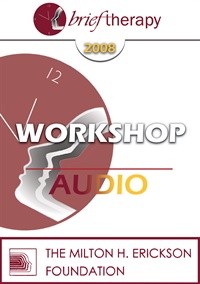
- Average Rating:
- Not yet rated
- Topic Areas:
- Workshops | Relationships | Brief Therapy | Therapist Development
- Categories:
- Brief Therapy Conference | Brief Therapy Conference 2008
- Faculty:
- Steve Andreas, MA, NLP
- Duration:
- 2:32:52
- Format:
- Audio Only
- Original Program Date:
- Dec 11, 2008
- Short Description:
- This workshop introduces a clear, experiential way to untangle difficult relationships by separating self, other, and observer positions. Through live demonstration and guided exploration, it shows how shifting physical orientation, language, and attention can dissolve emotional confusion, increase compassion, and restore clarity, helping clients decide how they want to relate, respond, or move forward.
- Price:
- $15.00 - Base Price

- Average Rating:
- Not yet rated
- Topic Areas:
- Workshops | Relationships | Brief Therapy | Therapeutic Relationship | Therapist Development
- Categories:
- Brief Therapy Conference | Brief Therapy Conference 2008
- Faculty:
- Jeffrey Kottler, PhD
- Duration:
- 2:12:03
- Format:
- Audio Only
- Original Program Date:
- Dec 12, 2008
- Short Description:
- The Personal and professional dimensions of a therapist's life often intersect, leading to reciprocal influence that takes place in sessions. This experiential workshop explores the ways that therapists are often transformed by their work helping others and enhances their productivity and life satisfaction.
- Price:
- $15.00 - Base Price
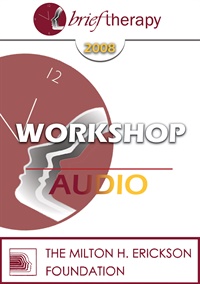
- Average Rating:
- Not yet rated
- Topic Areas:
- Workshops | Psychotherapy | Tailoring | Relationships | Brief Therapy | Therapeutic Relationship | Therapist Development
- Categories:
- Brief Therapy Conference | Brief Therapy Conference 2008
- Faculty:
- John C. Norcross, PhD
- Duration:
- 2:28:30
- Format:
- Audio Only
- Original Program Date:
- Dec 12, 2008
- Short Description:
- Psychotherapy will maximize its effectiveness by targeting the most powerful sources of change: the therapeutic relationship and the patient him/herself. This clinical workshop will provide integrative methods for customizing therapy relationships to individual patients. Participants will learn to reliably assess and rapidly apply four evidence-based guidelines (patient preferences, stages of change, resistance level, and real-time feedback) for constructing the "relationship of choice."
- Price:
- $15.00 - Base Price
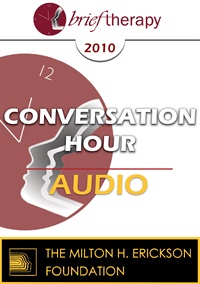
- Average Rating:
- Not yet rated
- Topic Areas:
- Psychotherapy | Conversation Hours | Relationships | Brief Therapy
- Categories:
- Brief Therapy Conference | Brief Therapy Conference 2010
- Faculty:
- John C. Norcross, PhD
- Duration:
- 1:03:50
- Format:
- Audio Only
- Original Program Date:
- Dec 11, 2010
- Short Description:
- BT10 Conversation Hour 09 - Psychotherapy Relationships that Work - John Norcross, PhD Psychotherapy Relationships That Work with John Norcross
- Price:
- $15.00 - Base Price
- Average Rating:
- Not yet rated
- Topic Areas:
- Couples Therapy | Keynotes | Brief Therapy | Relationships
- Categories:
- Brief Therapy Conference | Brief Therapy Conference 2010
- Faculty:
- Sue Johnson, EdD
- Course Levels:
- Master Degree or Higher in Health-Related Field
- Duration:
- 1:14:04
- Format:
- Audio and Video
- Original Program Date:
- Dec 09, 2010
- Short Description:
- Couple therapy will flourish as this field integrates research from social and neuropsychology and clarifies the processes that mediate change in love relationships. It will address more and more “individual” physical and mental health problems, relationship traumas and sexual issues. We can integrate science and the sizzle of “hot” emotion to transform individuals and relationships.
- Price:
-
Sale is $29.00
price reduced from Base Price - $59.00
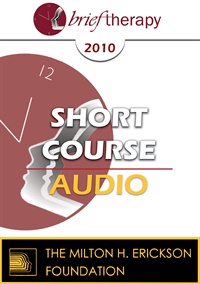
- Average Rating:
- Not yet rated
- Topic Areas:
- Short Courses | Brief Therapy | Footprinting | Relationships
- Categories:
- Brief Therapy Conference | Brief Therapy Conference 2010
- Faculty:
- Susan Dowell, MSW | Rick Miller, MSW
- Duration:
- 1:31:09
- Format:
- Audio Only
- Original Program Date:
- Dec 09, 2010
- Short Description:
- Footprintings® provides effective, easy to use tools for observing and experiencing Self States and repairing relational issues between them. Using color Footprints to diagram relationships between Parts, participants can step into different Self States, gaining deeper connection to body experience, affect and cognitive orientation of each State, while healing internal relationships.
- Price:
- $15.00 - Base Price

- Average Rating:
- Not yet rated
- Topic Areas:
- Couples Therapy | Short Courses | Intimacy | Relationships | Brief Therapy | Psychotherapy
- Categories:
- Brief Therapy Conference | Brief Therapy Conference 2010
- Faculty:
- Robert Johansen, PhD | Ian Johansen, PhD | Todd Gaffney, PhD
- Duration:
- 1:29:17
- Format:
- Audio Only
- Original Program Date:
- Dec 09, 2010
- Short Description:
- This workshop will introduce a new cognitive model for brief, solution-focused psychotherapy for couples. This cognitive paradigm is unique in several ways. It points to the fact that no one knows the client better than his/her intimate partner. The client’s partner pushes, pulls, and teases every imperfection of out their partner’s personality. Specifically, intimacy reveals what is incomplete about the client’s emotional development. It also reveals how effectively the client manages the needs he or she brings to the relationship. This is precisely what clients need to study themselves and points to what we as therapists can do to help our clients. With Robert Johansen, Ian Johansen and Todd Gaffnet.
- Price:
- $15.00 - Base Price
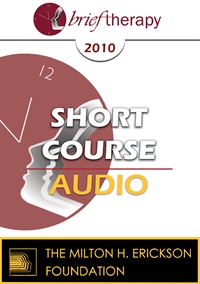
- Average Rating:
- Not yet rated
- Topic Areas:
- Couples Therapy | Short Courses | Gestalt | Intimacy | Relationships | Neurobiology | Neuroscience
- Categories:
- Brief Therapy Conference | Brief Therapy Conference 2010
- Faculty:
- Roberta Karant, PhD | Stefan Deutsch
- Duration:
- 1:33:35
- Format:
- Audio Only
- Original Program Date:
- Dec 09, 2010
- Short Description:
- Couples in distress minimize and numb their pain by avoiding contact. By writing a vision of what they both want, the therapist can focus the couple on the future. By combining Gestalt concepts with those popularized by Hendrix and others, therapists can have a powerful effect on quickening the healing process. New sessions will involve writing, note taking, and an agreed upon assignment to be practiced during the week. With Roberta Karant and Stefan Deutsch.
- Price:
- $15.00 - Base Price


